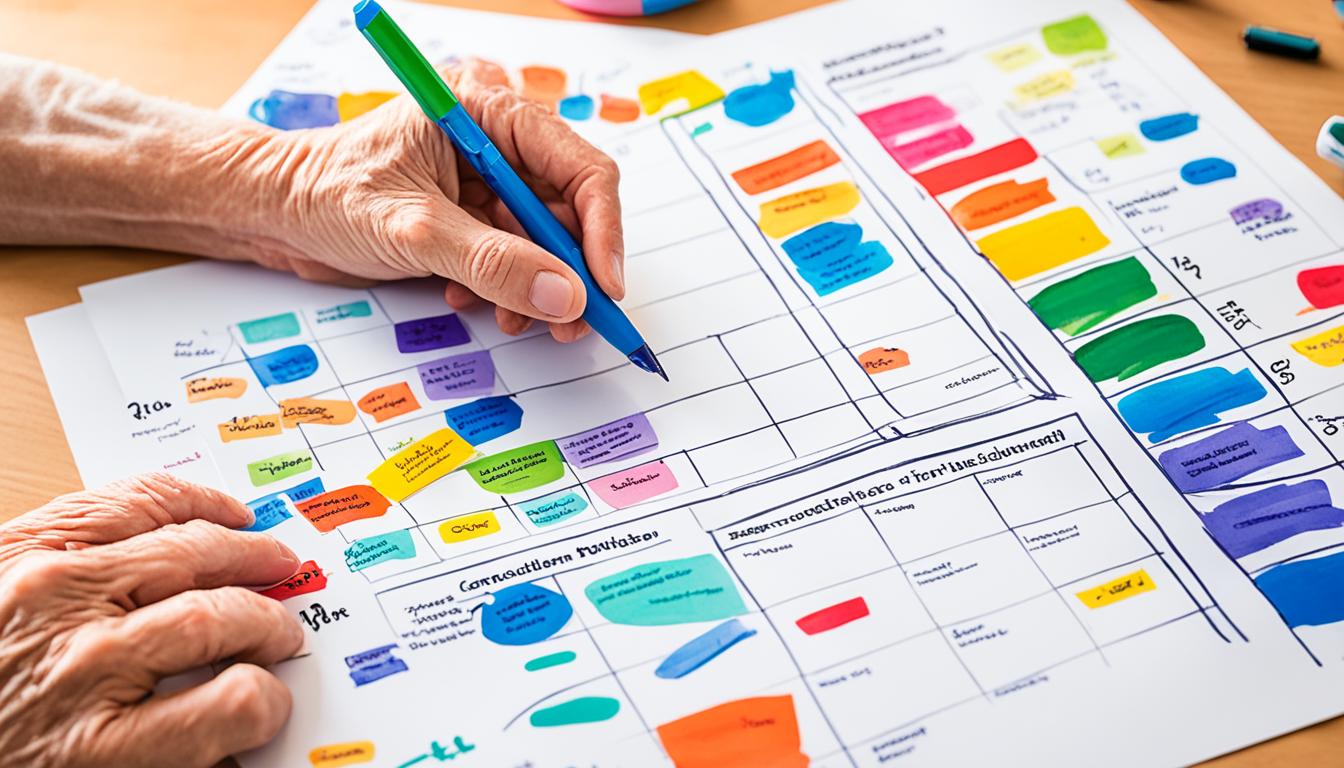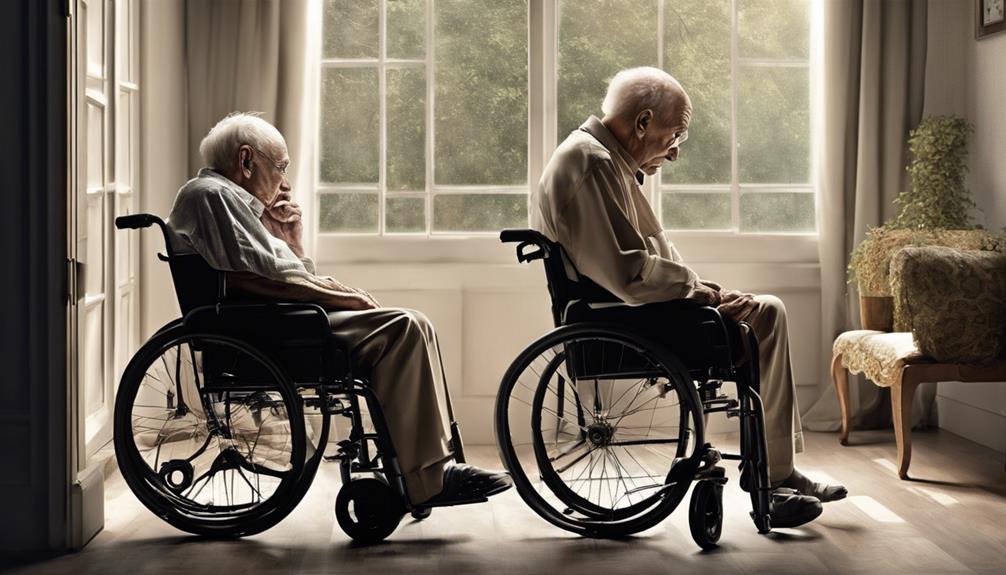Did you know that participating in enriching activities can greatly improve the happiness and cognitive engagement of your parent who has dementia? Dealing with the challenges of dementia can be daunting, but including dementia-friendly activities in their daily schedule can make a positive impact on their quality of life. Whether it’s trying out different sounds or watching virtual videos with loved ones, there are numerous options available to provide your family member with meaningful experiences. In this article, we will discuss a range of engaging activities designed to cater to the interests and abilities of individuals with dementia.
Key Takeaways:
- Engaging in stimulating activities can enhance the joy and cognitive engagement of individuals with dementia.
- Activities should be tailored to the interests and abilities of your loved one.
- Recommended activities include experimenting with sounds, visual expression through painting and drawing, sensory craft experiences, and more.
- Reminiscing through classic movies, music, photo albums, and magazines can also be meaningful activities.
- Cognitive activities, sensory experiences, creative outlets, group activities, and technology-based experiences can all contribute to the well-being of individuals with dementia.
Tips for Planning Activities for Seniors with Dementia
When planning activities for seniors with dementia, it’s crucial to consider their cognitive abilities, interests, and the progression of their condition. By tailoring activities to their unique needs, you can create engaging and age-appropriate experiences that promote well-being and reduce distress.
Keep it Simple and Enjoyable
To minimize frustration and anxiety, choose activities that are simple, enjoyable, and familiar to your loved one. Opt for tasks that they can easily understand and complete, providing a sense of accomplishment and boosting their self-confidence. Remember, it’s the process of engagement that matters, not the end result.
Match Activities to Cognitive Abilities
In the early stages of dementia, focus on activities that help retain independence and cognitive abilities. Consider tasks that tap into their existing skills and hobbies. As the disease progresses, adapt activities to their changing abilities, making them more structured and tailored to their current cognitive level.
Choose Failure-Free Activities
It’s essential to select activities that match their ability level and minimize the risk of failure. Failure-free activities allow your loved one to engage without feeling overwhelmed or discouraged. Look for tasks that provide clear instructions, require minimal supervision, and accommodate any limitations caused by their dementia.
Stimulate the Senses and Memories
Engaging the senses can enrich the activity experience for individuals with dementia. Incorporate sensory elements such as textures, scents, and familiar sounds, as they can help evoke memories and create a more immersive and meaningful experience. For example, listening to their favorite music or handling textured objects can enhance their engagement and enjoyment.
Remember, the goal of planning activities for seniors with dementia is to provide them with a sense of purpose, connection, and enjoyment. By tailoring activities to their abilities and preferences, you can create meaningful experiences that promote their overall well-being.
15 Fun Activities for Elderly Dementia Patients
Engaging in stimulating activities is not only beneficial for elderly dementia patients but can also bring joy and enhance their cognitive abilities. Here are 15 enjoyable and stimulating activities you can try with your loved ones:
- Going for walks: Take a leisurely stroll in a park or around the neighborhood to enjoy fresh air and gentle exercise.
- Planting flowers: Engage in gardening activities, such as planting colorful flowers, to stimulate the senses and promote relaxation.
- Feeding the birds: Set up a bird feeder in the backyard or visit a local park to watch birds and connect with nature.
- Folding laundry: Involve them in simple household tasks like folding laundry, which provides a sense of accomplishment and purpose.
- Listening to music: Play their favorite songs or music from their era to evoke memories and create a soothing atmosphere.
- Looking at family photo albums: Flip through old photo albums together and encourage them to share stories and reminisce.
- Preparing afternoon tea: Bond over the ritual of preparing a cup of tea or coffee, complete with their favorite biscuits or treats.
- Watching favorite sports or movies: Enjoy watching their preferred sports events or movies together, providing entertainment and engagement.
- Playing with playdough: Engage their tactile senses by providing playdough to mold, squeeze, and create different shapes and objects.
- Doing puzzles: Work on puzzles together, selecting options that match their ability level and provide mental stimulation.
- Playing board games like Guess Who? and Battleship: Have fun with classic board games that require strategic thinking and social interaction.
- Having a remote-controlled pet: Consider getting a lifelike remote-controlled pet as a companion, offering comfort and amusement.
- Creating artwork: Encourage them to engage in art activities like painting or drawing to stimulate their creativity.
- Trying out sensory activities: Explore different sensory experiences, such as feeling different textures, smelling familiar scents, and tasting favorite flavors.
- Engaging in gentle exercises: Incorporate light exercises like stretching or seated movements to promote physical well-being.
By engaging in these activities, you can create meaningful moments and enhance the quality of life for your loved ones with dementia.

6 Sensory Activities for Dementia Patients
Sensory activities can greatly benefit individuals with dementia by stimulating their senses and evoking fond memories. Engaging in these activities can provide a source of comfort, joy, and cognitive stimulation for your loved ones. Here are six sensory activities that you can try:
- Surrounding them with familiar scents: Fill the air with the aroma of their favorite smells, such as fresh-cut grass or the fragrance of warm bread baking in the oven. Scents can evoke strong emotions and trigger pleasant memories.
- Touching familiar objects: Encourage your loved one to interact with objects that hold personal significance, like keys or hand-embroidered beads. By touching and feeling these objects, they may experience a sense of familiarity and comfort.
- Tasting favorite foods: Prepare their favorite dishes or flavors that hold sentimental value. Tasting these familiar flavors can evoke emotions and trigger memories associated with them.
- Feeling different textures: Provide various textures for sensory exploration, such as animal fur or the sensation of damp soil and leaves. Running their fingers through different textures can be both engaging and calming.
- Listening to soothing music: Create a calming environment by playing their favorite songs or soothing melodies. Music has the power to evoke emotions and bring back cherished memories.
- Engaging in gentle massages: Use light, comforting touch to soothe and relax your loved one. Massages can help promote a sense of calmness and well-being.
These sensory activities can be adapted and customized based on your loved one’s preferences and abilities. Remember to observe their reactions and adjust the activities accordingly to ensure their comfort and enjoyment.
By incorporating sensory activities into your caregiver routine, you can provide meaningful experiences and enhance the quality of life for individuals with dementia.

2 Creative Activities for Dementia Patients
Engaging in creative activities can offer numerous therapeutic benefits for seniors with dementia. Through artistic expression, individuals are able to communicate their emotions and find comfort within their creative pursuits. Here are two meaningful and engaging activities that can stimulate the creativity of dementia patients:
1. Painting and Drawing
Encouraging dementia patients to paint and draw provides them with a safe and expressive outlet to convey their feelings. This artistic endeavor allows them to communicate and connect with their emotions, even if they struggle with verbal communication. It’s important to provide large surfaces and bold colors to enhance their creative experience. By immersing themselves in the process of painting and drawing, individuals with dementia can find solace and tranquility in their art.
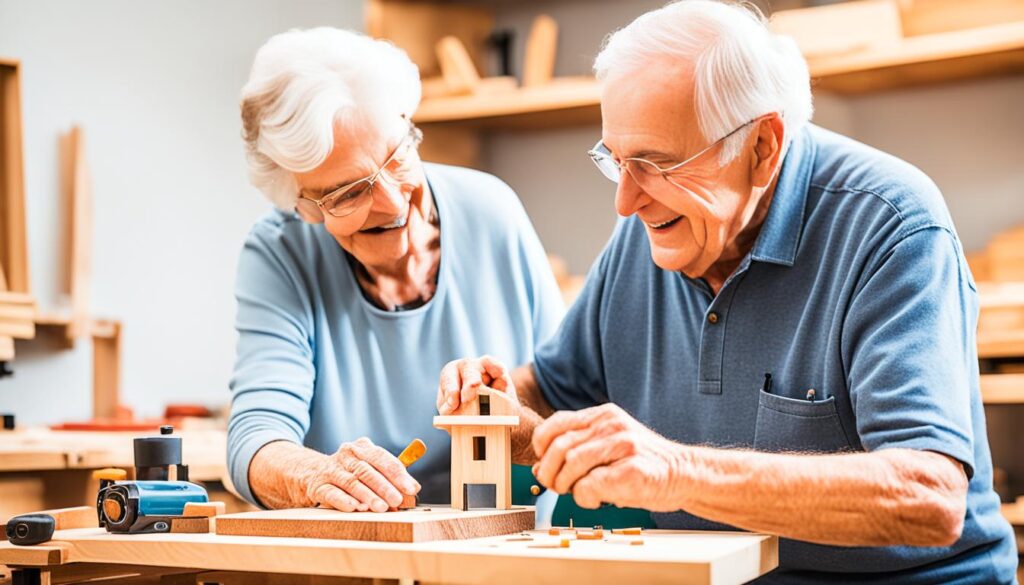
2. Collage Making
Engaging in collage-making activities can capture the attention of dementia patients and spark their creativity. Using images from magazines or old family photos, they can piece together a visual representation of their memories. This sensory experience allows them to revisit familiar moments and engage both their tactile and visual senses. As they carefully select and arrange the images, they are taken on a journey down memory lane, fostering their creativity and encouraging cognitive engagement.
Creative activities such as painting, drawing, and collage making have therapeutic benefits for individuals with dementia. These activities allow them to express their emotions, engage their senses, and foster creativity, providing a meaningful and enjoyable experience.
5 Group Activities for Dementia Patients
Group activities play a vital role in the therapeutic journey of dementia patients. These activities not only provide engagement and stimulation but also foster social interaction and a sense of camaraderie. As caregivers, we can create an environment that promotes connection and joy through group activities tailored to the needs of our loved ones.
1. Balloon Volleyball
Engage dementia patients in a friendly game of Balloon Volleyball. This low-impact activity enhances hand-eye coordination and promotes physical movement. With a soft balloon and a net or rope as a makeshift court, this enjoyable game can bring back cherished memories of friendly competitions.
2. Balloon Whack with Pool Noodles
Encourage dementia patients to participate in Balloon Whack using colorful pool noodles as paddles. This interactive activity stimulates motor skills and coordination while providing a fun way to engage with others. The gentle motion and cheerful colors make it an engaging and therapeutic experience.
3. Sing-alongs with Songs from the Patients’ Era
Music has a powerful effect on individuals with dementia, evoking memories and emotions. Create a personalized playlist of songs from the patients’ era and host a sing-along session. Singing together not only triggers fond memories but also fosters a sense of community and emotional well-being.
4. Gardening Together
Engage dementia patients in gardening activities, such as planting flowers or tending to a small vegetable garden. The sensory experience of touching the soil, smelling the plants, and nurturing living things can be incredibly therapeutic. Group gardening activities offer a sense of purpose, connection with nature, and an opportunity for social interaction.
5. A Shared Fish Tank for Visual Stimulation and Care
A shared fish tank provides visual stimulation and a calming atmosphere for dementia patients. Watching the fish swim and observing the vibrant colors can reduce anxiety and improve overall well-being. Encourage patients to participate in the care of the fish, such as feeding them or cleaning the tank together. This activity promotes a sense of responsibility and engagement with the natural world.
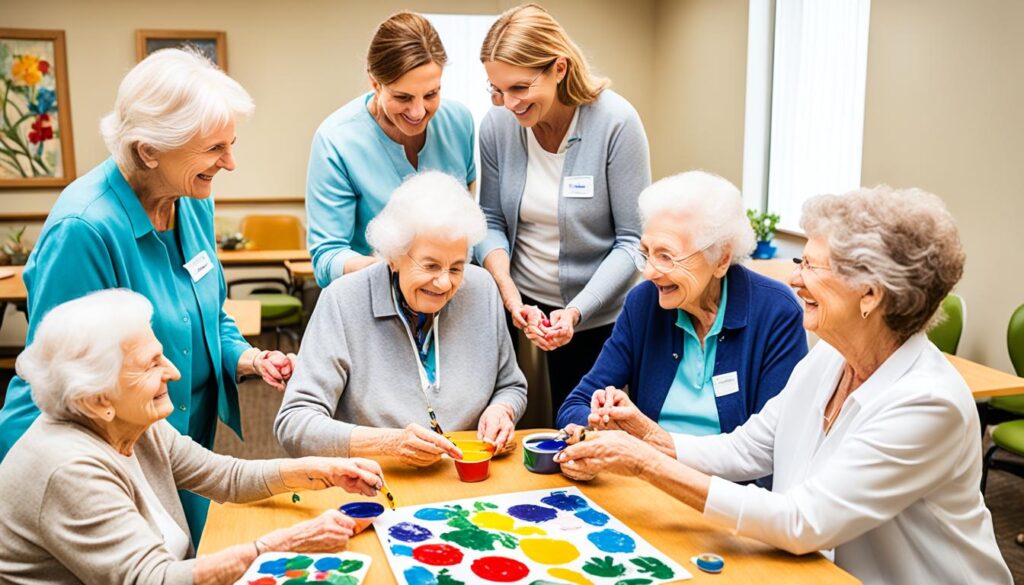
Engaging in group activities that promote social interaction and a sense of camaraderie can greatly enhance the well-being of dementia patients. From friendly games to shared hobbies, these activities create opportunities for connection and joy. As caregivers, we play a crucial role in providing therapeutic and engaging experiences for our loved ones.
2 Cognitive Activities for Dementia Patients
Engaging in cognitive activities can greatly benefit dementia patients by stimulating their memory and cognitive skills. These activities not only provide mental stimulation but also offer opportunities for meaningful connections and reminiscing.
Looking Through Photo Albums and Engaging in Conversation
Looking through photo albums can be a powerful cognitive activity for dementia patients. By reminiscing and discussing past memories, patients can exercise their recall and storytelling abilities. As caregivers, we can join in the conversation, encouraging them to share their thoughts, emotions, and personal experiences.
“The joy of looking through old photo albums and sharing stories about our lives can create a sense of nostalgia and bring back cherished memories. It’s a beautiful way to connect with our loved ones and foster a sense of belonging.”
To make this activity even more engaging, you can organize the photo albums by themes or periods of their life. For example, you could create an album dedicated to family vacations or a specific decade. By focusing on specific topics, you can prompt more focused discussions and help trigger memories associated with those particular events or periods.
Completing Puzzles Together
Puzzles are not only a popular pastime but also an excellent exercise for the brain. Completing puzzles together with dementia patients can provide a sense of accomplishment while promoting cognitive abilities such as problem-solving, spatial awareness, and attention to detail.
“Working on puzzles with our loved ones can be a fun and engaging activity that stimulates their minds and encourages focus and concentration. It’s also an opportunity for us to bond and enjoy each other’s company.”
When choosing puzzles, opt for ones with larger and visually appealing pieces to make them more accessible for dementia patients. Select the appropriate difficulty level based on their cognitive abilities, ensuring the puzzles provide a reasonable challenge without leading to frustration.
Remember to create a calm and comfortable environment during puzzle time. Play soft background music, provide adequate lighting, and eliminate any distractions that may disrupt their concentration.
| Cognitive Activity | Benefits |
|---|---|
| Looking Through Photo Albums | – Stimulates memory recall – Enhances storytelling abilities – Fosters emotional connection |
| Completing Puzzles | – Improves problem-solving skills – Enhances spatial awareness and attention to detail – Provides a sense of accomplishment |
By incorporating these cognitive activities into the daily routine of dementia patients, we not only provide them with mental stimulation but also create meaningful moments of connection, joy, and engagement.
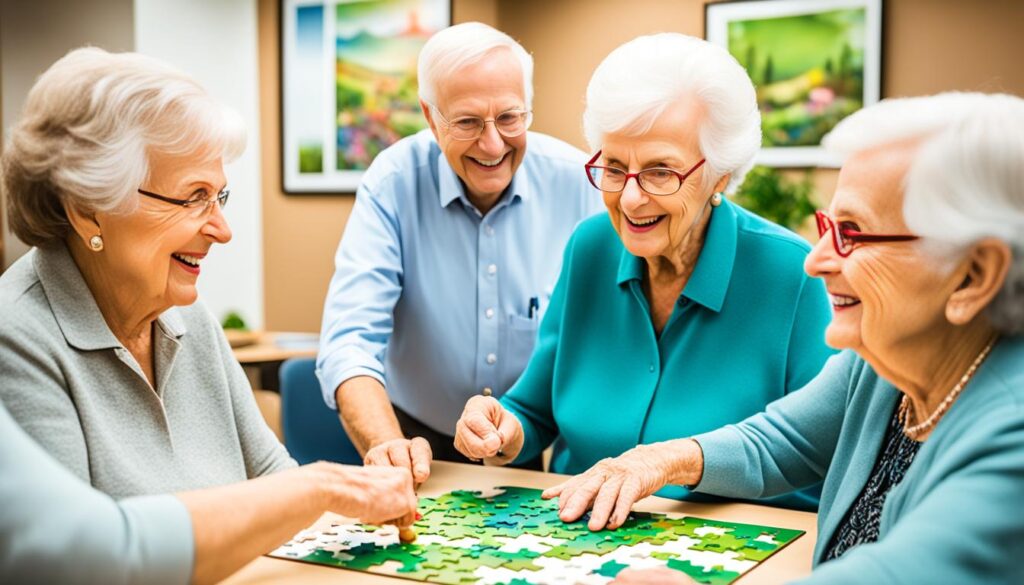
Technology-Based Dementia Activities for Seniors
Embracing technology can provide a wide range of engaging and mentally nourishing experiences for seniors with dementia. We understand that finding suitable activities for your loved ones can be challenging, which is why we’ve compiled a list of technology-based activities that can help boost memory and provide entertainment.
1. Explore with Live Cams
Using live cams, seniors can virtually explore various locations and observe nature and art. Whether it’s watching live animal cams at the zoo or taking a virtual tour of famous museums, this activity can provide a sense of adventure and discovery.
2. Journey with Google Earth
With Google Earth, seniors can embark on virtual journeys to familiar places or dream destinations. They can revisit their childhood home or virtually wander through scenic landscapes, triggering memories and imagination.
3. Create a Family Video Tablet
A family video tablet can be a source of comfort and entertainment for dementia patients at home. Collect and compile personalized videos from family members, capturing special moments, messages of love, and familiar faces. Watching these videos can evoke memories and foster a sense of connection.

| Activity | Benefits |
|---|---|
| Explore with Live Cams | Provides virtual adventures and sparks curiosity |
| Journey with Google Earth | Allows seniors to virtually visit familiar or dream locations |
| Create a Family Video Tablet | Offers comfort, entertainment, and a sense of connection |
Conclusion
Engaging in activities that enhance cognitive health and emotional comfort for seniors with dementia can greatly improve their quality of life. By tailoring activities to their interests and abilities, and focusing on sensory experiences, creativity, cognitive stimulation, social interaction, and technology-based experiences, caregivers can provide meaningful and joyful experiences for their loved ones with dementia.
Meaningful activities for dementia patients involve tapping into their individual preferences and past experiences. Encouraging creative outlets such as painting, drawing, and collage-making allows them to express themselves, while engaging in stimulating cognitive activities like completing puzzles and reminiscing boosts memory and cognitive skills. Incorporating sensory activities, such as smelling familiar scents and feeling different textures, can evoke memories and provide comfort. Group activities and technology-based experiences also foster social interaction and mental engagement.
Remember, every person with dementia is unique, so it’s essential to observe their responses and adjust the activities accordingly. Engaging in these activities not only benefits your loved one’s cognitive and emotional well-being, but it also strengthens the bond between you and creates memorable moments together. So go ahead, make a difference in their lives by incorporating meaningful and engaging activities into their daily routines.
FAQ
What are some engaging activities for a parent with dementia?
Some engaging activities for a parent with dementia include experimenting with sounds, visual expression through painting and drawing, exploring sensory craft experiences, and creating collages using old images. Reminiscing through classic movies, listening to music, looking through photo albums, and journeying back in time by exploring old magazines can also be meaningful activities for your parent. Folding laundry, engaging in handy activities, untying knots, doing puzzles, playing games, and using technology-based activities like live cams and virtual family videos can provide cognitive stimulation and entertainment. Sensory activities such as smelling familiar scents, touching familiar objects, tasting familiar flavors, and feeling different textures can be invigorating for individuals with dementia.
What are some tips for planning activities for seniors with dementia?
When planning activities for seniors with dementia, it’s important to consider their cognitive abilities, interests, and the progression of their condition. Activities should be simple, enjoyable, and familiar to reduce frustration and anxiety. For individuals in the early stages of dementia, activities that retain their independence and cognitive abilities are recommended. As the disease progresses, activities should become more structured and tailored to their current abilities. It’s important to choose failure-free activities that match their ability level, are low-maintenance with simple steps, and provide a sense of accomplishment. Activities should also be stimulating, engaging the senses and memories.
What are some fun activities for elderly dementia patients?
Fun activities for elderly dementia patients can include going for walks, planting flowers, feeding the birds, engaging in simple household tasks like folding laundry, listening to music, looking at family photo albums, preparing afternoon tea, watching favorite sports or movies, playing with playdough or doing puzzles, playing board games like Guess Who? and Battleship, and even having a remote-controlled pet for companionship and amusement.
What are some sensory activities for dementia patients?
Sensory activities can be particularly beneficial for individuals with dementia. These activities stimulate the senses and evoke fond memories. Suggestions for sensory activities include surrounding your loved one with familiar scents, such as fresh-cut grass or the aroma of warm bread, touching familiar objects like keys or hand-embroidered beads, tasting favorite foods that may elicit emotions and memories, and feeling different textures like animal fur or damp soil and leaves.
What are some creative activities for dementia patients?
Creative activities can provide emotional expression and therapeutic benefits for dementia patients. Painting and drawing can be a safe and creative way for individuals with dementia to express their feelings. Encouraging the use of bold colors on big surfaces and providing materials like clay for tactile stimulation can also be enjoyable activities. Additionally, creating collages using images from magazines or old family photos can enhance their creativity and engagement.
What are some group activities for dementia patients?
Group activities can be particularly beneficial for dementia patients, as they provide social interaction and a sense of camaraderie. These activities can include balloon volleyball, balloon whack with pool noodles, sing-alongs with songs from the patients’ era, gardening together, and having a shared fish tank for visual stimulation and care.
What are some cognitive activities for dementia patients?
Engaging in cognitive activities can help stimulate memory and cognitive skills in dementia patients. Two suggested cognitive activities are looking through photo albums and engaging in conversation about past memories and subjects of interest, as well as completing puzzles together that are entertaining and cognitively beneficial.
What are some technology-based dementia activities for seniors?
Embracing technology can provide a wide range of engaging and mentally nourishing experiences for seniors with dementia. Suggestions include using live cams to explore nature and art, venturing globally with Google Earth to visit familiar places or dream destinations, and creating a family video tablet with personalized videos to provide comfort and entertainment for dementia patients at home.
How can engaging activities improve the quality of life for dementia patients?
Engaging in activities that enhance cognitive health and emotional comfort for seniors with dementia can greatly improve their quality of life. By tailoring activities to their interests and abilities, and focusing on sensory experiences, creativity, cognitive stimulation, social interaction, and technology-based experiences, caregivers can provide meaningful and joyful experiences for their loved ones with dementia.
